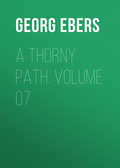
Georg Ebers
The Bride of the Nile. Volume 09
"You," replied Gibbus, raising his hands in entreaty.
"I-oh, of course, I!" growled the physician. "Whatever is difficult, painful, intolerable, falls on my shoulders as a matter of course! But I cannot—ought not—I will not do it. Had I any part or lot in devising this mad expedition? You observe, Father?—What he, the simpleton, brewed, I—I again am to drink. Fate has settled that!"
"It is hard, it is hard, child!" replied the old man. "Still, it is your duty. Only consider—if that man, as he stands before us now, were to appear before the women…."
But Philippus broke in: "No, no, that would not do! And you, Gibbus— this very day there has been an Arab again to see Joanna; and if they were to suspect that you had been with your master—for you look strangely.—No, man; your devotion merits a better reward. They shall not catch you. I release you from your service to the widow, and we— what do you say, Father?—we will keep him here."
"Right, very right," said Horapollo. "The Nile must some day rise again. Stay with us; I have long had a fancy to eat vegetables of my own growing."
But Gibbus firmly declined the offer, saying he wished to return to his old mistress. When the physician again pointed out to him how great a danger he was running into, and the old man desired to know his reasons, the hunch-back exclaimed:
"I promised my master to stay with the women; and now, while in all the household I am the only free man, shall I leave them unprotected to secure my own miserable life? Sooner would I see a scimitar at my throat. When my head is off the rascals are welcome to all that is left."
The words came hollow and broken from his parched tongue, and as he spoke the faithful fellow's face changed. Even under the dust he turned pale, and Philippus had to support him, for his feet refused their office. His long tramp through the torrid heat had exhausted his strength; but a draught of wine soon brought him to himself again and Horapollo ordered the slave to lead him to the kitchen and desire the cook to take the best care of him.
As soon as the friends were alone, the elder observed:
"That worthy, foolhardy, old child who is now dead, seems to have left you some strange request. I could see that as you were reading."
"There—take it!" replied Philippus; and again he walked up and down the room, while Horapollo took the letter. Both faces of the tablets were covered with irregular, up-and-down lines of writing to the following effect:
"Rufinus, in view of death, to his beloved Philippus:
"One shivering fit after another comes over me; I shall certainly die to-day. I must make haste. Writing is difficult. If only I can say what is most pressing.—First: Joanna and the poor child. Be everything you can be to them. Protect them as their guardian, Kyrios, and friend. They have enough to live on and something still to spare for others. My brother Leonax manages the property, and he is honest. Joanna knows all about it.—Tell her and the poor child that I send them ten thousand blessings—and to Joanna endless thanks for all her goodness.—And to you, my friend: heed the old man's words. Rid your heart of Paula. She is not for you: you know, young Orion. But as to yourself: Those who were born in high places rarely suit us, who have dragged ourselves up from below to a better position. Be her friend; that she deserves—but let that be all. Do not live alone, a wife brings all that is best into a man's life; it is she who weaves sweet dreams into his dull sleep. You know nothing of all this as yet; and your worthy old friend—to whom my greetings—has held aloof from it all his life….
"For your private eye: it is a dying man who speaks thus. You must know that my poor child, our Pul, regards you as the most perfect of men and esteems you above all others. You know her and Joanna. Bear witness to your friend that no evil word ever passed the lips of either of them. Far be it from me to advise you, who bear the image of another woman in your heart,—to say: marry the child, she is the wife for you. But this much to you both—Father and son—I do advise you to live with the mother and daughter as true and friendly house-mates. You will none of you repent doing so. This is a dying man's word. I can write no more. You are the women's guardian, Philip, a faithful one I know. A common aim makes men grow alike. You and I, for many a year.—Take good care of them for me; I entreat you—good care."
The last words were separated and written all astray; the old man could hardly make them out. He now sat looking, as Phillipus had done before, sorely puzzled and undecided over this strange document.
"Well?" asked the leech at last.
"Aye-well?" repeated the other with a shrug. Then both again were silent; till Horapollo rose, and taking his staff, also paced the room while he murmured, half to himself and half to his younger friend "They are two quiet, reasonable women. There are not many of that sort, I fancy. How the little one helped me up from the low seat in the garden!" It was a reminiscence that made him chuckle to himself; he stopped Philippus, who was pacing at his side, by lightly patting his arm, exclaiming with unwonted vivacity: "A man should be ready to try everything—the care of women even, before he steps into the grave. And is it a fact that neither of them is a scold or a chatter-box?"
"It is indeed."
"And what 'if' or 'but' remains behind?" asked the old man. "Let us be reckless for once, brother! If the whole business were not so diabolically serious, it would be quite laughable. The young one for me and the old one for you in our leisure hours, my son; better washed linen; clothes without holes in them; no dust on our books; a pleasant 'Rejoice' every morning, or at meal-times;—only look at the fruit on that dish! No better than the oats they strew before horses. At the old man's everything was as nice as it used to be in my own home at Philae: Supper a little work of art, a feast for the eye as well as the appetite! Pulcheria seems to understand all that as well as my poor dead sister did. And then, when I want to rise, such a kind, pretty little hand to help one up! I have long hated this dwelling. Lime and dust fall from the ceiling in my bedroom, and here there are wide gaps in the flooring- I stumbled over one yesterday—and our niggardly landlords, the officials, say that if we want anything repaired we may do it ourselves, that they have no money left for such things. Now, under that worthy old man's roof everything was in the best order." The philosopher chuckled aloud and rubbed his hands as he went on: "Supposing we kick over the traces for once, Philip. Supposing we were to carry out our friend's dying wish? Merciful Isis! It would certainly be a good action, and I have not many to boast of. But cautiously—what do you say? We can always throw it up at a month's notice."
Then he grew grave again, shook his head, and said meditatively: "No, no; such plans only disturb one's peace of mind. A pleasant vision! But scarcely feasible."
"Not for the present, at any rate," replied the leech.
"So long as Paula's fate remains undecided, I beg you to let the matter rest."
The old man muttered a curse on her; then he said with a vicious, sharp flash in his eyes: "That patrician viper! Every where in everything—she spoils it all! But wait a while! I fancy she will soon be removed from our path, and then… No, even now, at the present time, I will not allow that we should be deprived of what would embellish life, of doing a thing which may turn the scale in my favor in the day of judgment. The wishes of a dying man are sacred: So our fathers held it; and they were right. The old man's will must be done! Yes, yes, yes. It is settled. As soon as that hindrance is removed, we will keep house with the two women. I have said; and I mean it."
At this point the gardener came in again, and the old man called out to him:
"Listen, man. We shall live together after all; you shall hear more of this later. Stay with my people till sundown, but you must keep your own counsel, for they are all listeners and blabs. The physician here will now take the melancholy tidings to the unfortunate widow, and then you can talk it all over with her at night. Nothing startling must take place at the house there; and with regard to your master, even his death must remain a secret from every one but us and his family."
The gardener knew full well how much depended on his silence; Philippus tacitly agreed to the old man's arrangement, but for the present he avoided discussing the matter with the women. When, at length he set off on his painful errand to the widow, Horapollo dismissed him saying:
"Courage, courage, my Son.—And as you pass by, just glance at our little garden;—we grieved to see the fine old palm-tree perish; but now a young and vigorous shoot is growing from the root."
"It has been drooping since yesterday and will die away," replied Philippus shrugging his shoulders.
But the old man exclaimed: "Water it, Gibbus! the palm-tree must be watered at once."
"Aye, you have water at hand for that!" retorted the leech, but he added bitterly as he reached the stairs, "If it were so in all cases!"
"Patience and good purpose will always win," murmured the old man; and when he was alone he growled on angrily: "Only be rid of that dry old palm-tree—his past life in all its relations to that patrician hussy Away with it, into the fire!—But how am I to get her? How can I manage it?"
He threw himself back in his arm-chair, rubbing his forehead with the tips of his fingers. He had come to no result when the negro requested an audience for some visitors. These were the heads of the senate of Memphis, who had come as a deputation to ask counsel of the old sage. He, if any one, would find some means of averting or, at any rate, mitigating the fearful calamity impending over the town and country, and against which prayer, sacrifice, processions, and pilgrimages had proved abortive. They were quite resolved to leave no means untried, not even if heathen magic should be the last resource.
CHAPTER X
All Katharina's sympathy with Heliodora had died finally in the course of the past, moonless night. She had secretly accompanied her, with her maid and an old deaf and dumb stable-slave, to a soothsayer—for there still were many in Memphis, as well as magicians and alchemists; and this woman had told the young widow that her line of life led to the greatest happiness, and that even the wildest wishes of her heart would find fulfilment. What those wishes were Katharina knew only too well; the probability of their accomplishment had roused her fierce jealousy and made her hate Heliodora.
Heliodora had gone to consult the sorceress in a simple but rich dress. Her peplos was fastened on the shoulder, not by an ordinary gold pin, but by a button which betrayed her taste for fine jewels, as it consisted of a sapphire of remarkable size; this had at once caught the eye of the witch, showing her that she had to deal with a woman of rank and wealth. She had taken Katharina, who had come very plainly dressed, for her companion or poor friend, so she had promised her no more than the removal of certain hindrances, and a happy life at last, with a husband no longer young and a large family of children.
The woman's business was evidently a paying one; the interior of her house was conspicuously superior to the wretched hovels which surrounded it, in the poorest and most squalid part of the town. Outside, indeed, it differed little from its neighbors; in fact; it was intentionally neglected, to mislead the authorities, for witchcraft and the practice of magic arts were under the penalty of death. But the fittings of the roofless centre-chamber in which she was wont to perform her incantations and divinations argued no small outlay. On the walls were hangings with occult figures; the pillars were painted with weird and grewsome pictures; crucibles and cauldrons of various sizes were simmering over braziers on little altars; on the shelves and tables stood cups, phials, and vases, a wheel on which a wryneck hopped up and down, wax images of men and women—some with needles through their hearts, a cage full of bats, and glass jars containing spiders, frogs, leeches, beetles, scorpions, centipedes and other foul creatures; and lengthways down the room was stretched a short rope walk, used in a Thracian form of magic. Perfumes and pungent vapors filled the air, and from behind a curtain which hid the performers came a monotonous music of children's voices, bells, and dull drumming.
Medea, so the wise woman was called, though scarcely past five and forty, harmonized in appearance with this strange habitation, full as it was of objects calculated to rouse repulsion, dread, and amazement. Her face was pale, and her extraordinary height was increased by a mass of coal- black hair, curled high over a comb at the very top of her head.
At the end of the first visit paid her by the two young women, who had taken her by surprise, so that several things were lacking which on the second occasion proved to be very effective in the exercise of her art, she had made Heliodora promise to return in three days' time. The young widow had kept her word, and had made her appearance punctually with Katharina.
To be in Egypt, the land of sorcery and the magic arts, without putting them to the test, was impossible. Even Martina allowed this, though she did not care for such things for herself. She was content with her lot; and if any change for the worse were in prospect she would rather not be tormented beforehand by a wise prophet; nor was it better to be deluded by a foolish one. Happiness as of Heaven itself she no longer craved; it would only have disturbed her peace. But she was the last person to think ill of the young, whose life still lay before them, if they longed to look into futurity.
The fair widow and her companion crossed the sorceress' threshold in some trepidation, and Katharina was the more agitated of the two; for this afternoon she had seen Philippus leave the house of Rufinus, and not long after some Arab officials had called there. Paula had come into the garden shortly before sundown, her eyes red with weeping; and when, soon after, Pulcheria and her mother had joined her there, Paula had thrown herself on Joanna's neck, sobbing so bitterly that the mother and daughter—"whose tears were near her eyes"—had both followed her example. Something serious had occurred; but when she had gone to the house to pick up further information, old Betta, who was particularly snappish with her, had refused her admission quite rudely.
Then, on their way hither, she and Heliodora had had a painful adventure; the chariot, lent by Neforis to convey them as far as the edge of the necropolis, was stopped on the way by a troop of Arab horse, and they were subjected to a catechism by the leader.
So they entered the house of "Medea of the curls," as the common people called the witch, with uneasy and throbbing hearts; they were received, however, with such servile politeness that they soon recovered themselves, and even the timid Heliodora began to breathe freely again. The sorceress knew this time who Katharina was, and paid more respectful attention to the daughter of the wealthy widow.
The young crescent moon had risen, a circumstance which Medea declared enabled her to see more clearly into the future than she could do at the time of the Luna-negers as she called the moonless night. Her inward vision had been held in typhornian darkness at the time of their first visit, by the influence of some hostile power. She had felt this as soon as they had quitted her, but to-day she saw clearer. Her mind's eye was as clear as a silver mirror, she had purified it by three days' fasting and not a mote could escape her sight.—"Help, ye children of Horapollo! Help, Hapi and Ye three holy ones!"







